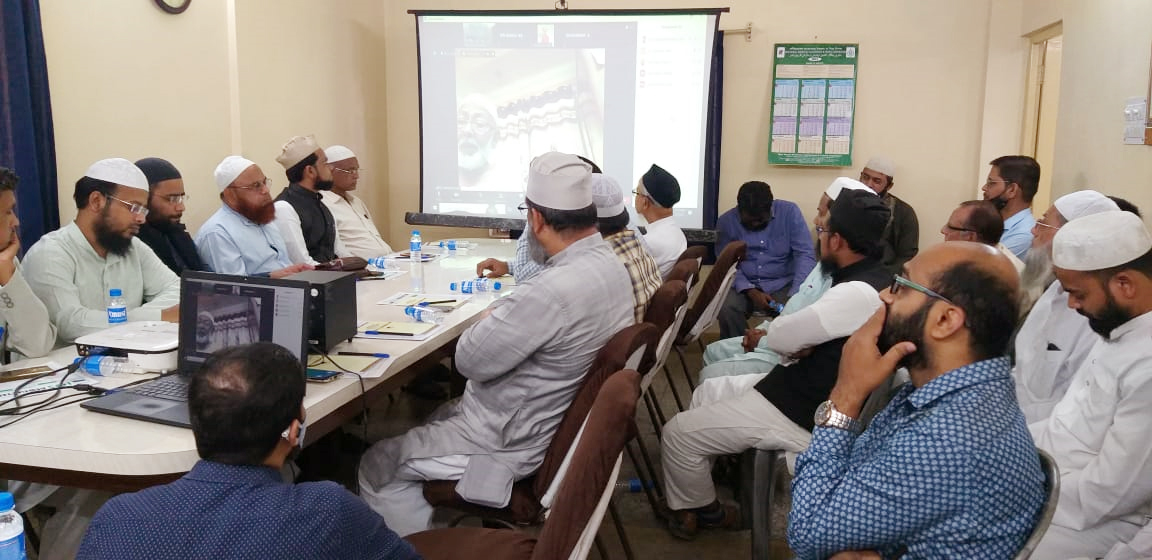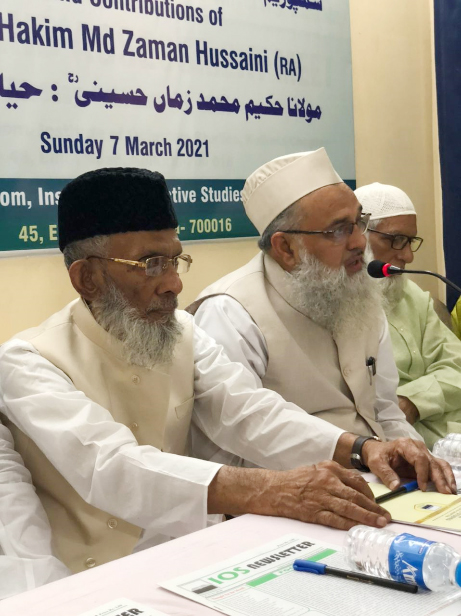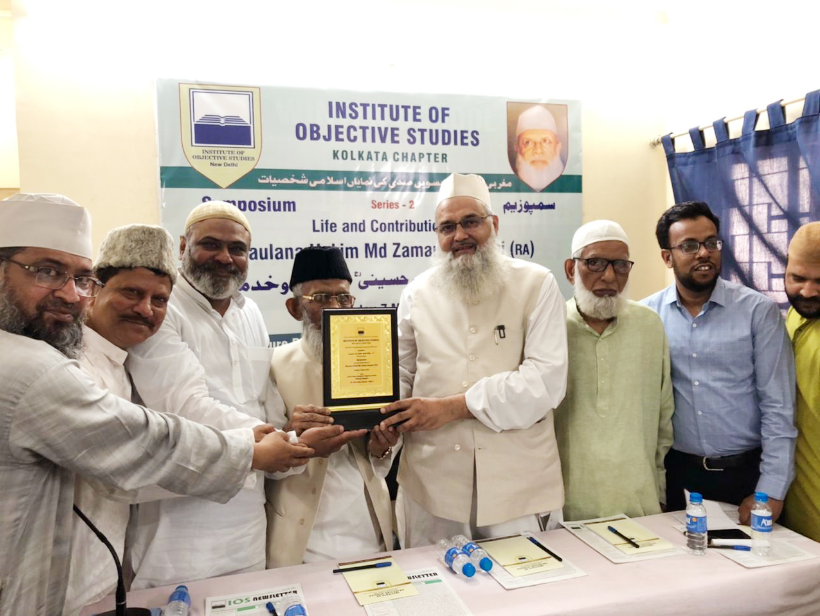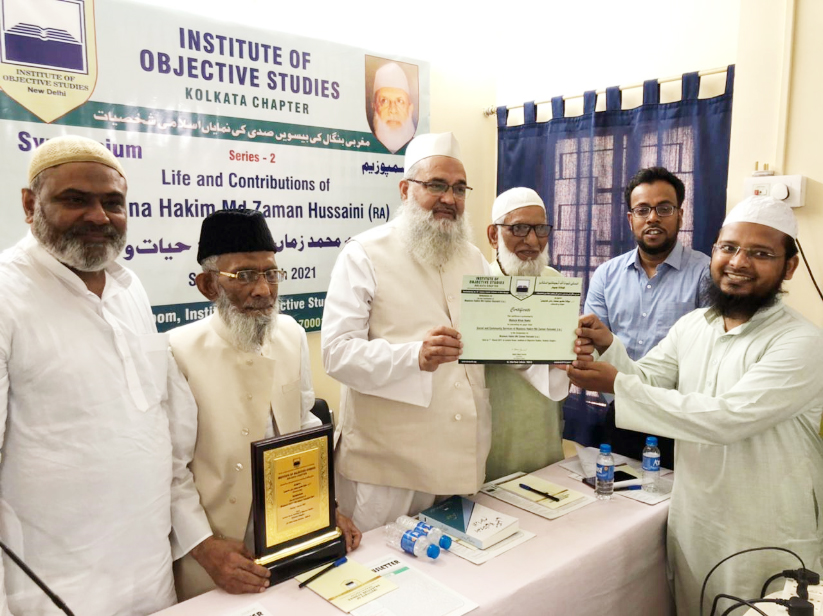IOS Kolkata Chapter organises symposium on “Social and Academic Contributions of Maulana Hakim Mohammad Zaman Hussaini (r.a.)”

Kolkata: Institute of Objective Studies, Kolkata chapter organised a symposium on “Social and Academic Contributions of Maulana Hakim Mohammad Zaman Hussaini (r.a.)” on 7th March 2021 at the Lecture Room of IOS Kolkata Chapter.
Kolkata Chapter is organising a series of symposiums under the theme -“Remembering the 20th Century Islamic Scholars of West Bengal“. This symposium was the second in its series after successfully organisation of the last symposium on the “Social and Academic Contributions of Maulana Abu Salma Shafi (r.a.)”.
Well-researched papers and lectures were presented by scholars on different aspects of life of Hakim Zaman Hussaini, a renowned Islamic scholar and social leader of Kolkata.
 Addressing the audience on this occasion, prominent scholar Maulana Khalid Ghazipuri, who is a teacher of Hadith at Darul Uloom Nadwatul Ulama, Lucknow said, “Hakim Zaman Hussaini is among those people, whose sincere efforts, contributions and sacrifices made them beloved to everyone. He had a good reputation and recognition among his contemporaries, an important aspect of his life was that apart from being a practising religious scholar he was strictly regular with Sunnah. He had a good command over different languages and the way he communicated with the people was exemplary.”
Addressing the audience on this occasion, prominent scholar Maulana Khalid Ghazipuri, who is a teacher of Hadith at Darul Uloom Nadwatul Ulama, Lucknow said, “Hakim Zaman Hussaini is among those people, whose sincere efforts, contributions and sacrifices made them beloved to everyone. He had a good reputation and recognition among his contemporaries, an important aspect of his life was that apart from being a practising religious scholar he was strictly regular with Sunnah. He had a good command over different languages and the way he communicated with the people was exemplary.”
He added, “We all know that Bengal is a place which gave a good number of poets, politicians and educationists to the country, but few people knew that Bengal has also been the birthplace of many great religious scholars. Thus, it is our duty to introduce these great religious scholars to the world and make the new generation aware of the lives and contributions of such scholars by publishing books, articles and conducting quiz competitions about them”. He appreciated the initiative taken by IOS Kolkata Chapter.
In his brief address Dr Mohammad Manzoor Alam, chairman of IOS, said, “If we are not attached with our history, our predecessors, their contributions and their sacrifices, we will never be able to achieve the goal we set for our future generations. He suggested that such seminars and symposiums should be conducted on a large scale so that they are more effective. He also said that it was the need of the hour to make the new generation aware of their glorious history. For that we should use every new method and means. He also advised the Kolkata Chapter to publish the works of these scholars in the regional language.
Introducing the purpose and the topic of the symposium, coordinator of IOS Kolkata Chapter, Abdul Basit Ismail said that in past people from Bengal had played leading roles in different fields of life. He added that at a time when every community was trying to learn lessons from their history and preserving the teachings and guidance of their predecessors, it is our duty to make Muslims aware of their glorious past, so that they could take guidance from it.

Maulana Aneesur Rahman Qasmi, who joined the meeting online through Zoom said that Hakim Zaman Hussaini had made a comprehensive study of the Quran. He had read almost all the famous books of commentary on the Quran. Apart from this he had in-depth knowledge of Hadith as well. His service to the Quran is a model for new generations of Islamic scholars.
Dr. Shamim Akhtar Qasmi, head of the department of Islamic Theology, Aliah University, presented his paper on “Life and Contributions of Maulana Hakim Mohammad Zaman Hussaini (r.a.)”. “Hakim Zaman Hussaini was among those extraordinary people whose contributions will keep benefitting people for a longer period of time”, he said. The community badly needed such personalities today, he added.

Views were expressed by eminent scholars like Qari Mohammed Ismail Zafar and Talha bin Abu Salma Nadvi and the family members of Hakim Zaman Hussaini- like Salman Hussaini and Hassan Hussaini.
The next symposium of this series will be organised soon on the academic contributions of Maulana Mahboobur Rahman Azhari.
Go Back